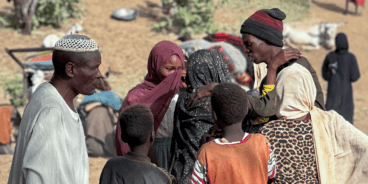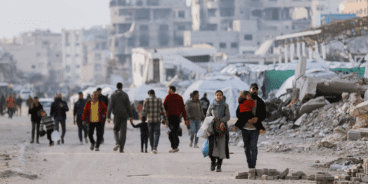

Atrocity Alert No. 398: Central Sahel, Ukraine and Democratic Republic of the Congo
Atrocity Alert is a weekly publication by the Global Centre for the Responsibility to Protect highlighting situations where populations are at risk of, or are enduring, mass atrocity crimes.
DRAMATIC RISE IN GRAVE VIOLATIONS AGAINST CHILDREN ACROSS THE CENTRAL SAHEL
Large-scale attacks by armed Islamist groups and intensifying clashes between militants and national security forces in recent months have increasingly exposed civilians across the Central Sahel to significant risk. The UN Children’s Fund (UNICEF) reported that almost 1,400 people were killed in Burkina Faso, Mali and Niger in the first three months of 2024, representing a 66 percent increase compared with the same period in 2023. On 31 May UN High Commissioner for Human Rights Volker Türk sounded the alarm over the devastating deterioration in Burkina Faso, where nearly 1,800 people were unlawfully killed between November and April alone. In one of the worst abuses committed by the military, more than 220 civilians, including 56 children, were summarily executed in attacks during late February that likely amount to crimes against humanity.
Children across the region are particularly vulnerable to atrocities and grave violations in armed conflict. UNICEF reported that in the last three months of 2023, grave violations against children rose by more than 70 percent compared with the previous three months. Most cases involved the recruitment and use of children and killing and maiming, which all together increased by more than 130 percent between October and December. UNICEF Regional Director for West and Central Africa Gilles Fagninou emphasized, “The distressing rise in violent incidents in the central Sahel region…including the killing of children, must stop… Civilians need protection from all forms of violence.”
Armed Islamist groups are recruiting children and forcing them to fight or work in support roles. On 30 May the UN Committee on the Rights of the Child expressed serious concern about the widespread recruitment and use of children by armed groups in Mali, which constitutes a war crime. These groups have also attacked education institutions and recruited children at school or while on their way to school. In Niger, the Norwegian Refugee Council recently alerted that over 800 schools remain closed in Tillabéri due to widespread insecurity, leaving children without a vital support network, as well as compounding the risks of recruitment and use.
These groups have also systematically blockaded entire towns and are restricting access to farmland, lining roads with explosive ordnance and strategically destroying and looting civilian objects. These tactics are used to terrorize populations, inflict collective suffering on communities and deprive them of an integral element of livelihoods. Save the Children recently warned that armed groups have trapped 80,000 children in Menaka, where food, medicines and other essential items have reached critical levels. The denial of humanitarian access is one of the six grave violations perpetrated against children in armed conflict and prohibited under International Humanitarian Law.
Yesterday, 4 June, marked the International Day of Innocent Children Victims of Aggression to acknowledge the pain suffered by children across the world who face unspeakable horrors. All armed actors in the Central Sahel must abide by their obligations under international law and cease perpetrating grave violations against children. The authorities should engage with the UN on concrete action plans to end grave violations, and, along with technical and financial partners, expand access to vital social services and protection. Children are not a target and deserve to always be protected.
CIVILIANS BEARING THE BRUNT OF RENEWED RUSSIAN OFFENSIVE IN KHARKIV
Since 10 May more than 45 civilians have been killed in Ukraine’s northeastern Kharkiv region following a renewed Russian offensive in the area. This includes a particularly grave attack on 25 May when Russian forces attacked a hardware store, causing an explosion and fire to engulf the store and killing at least 17 civilians, including a 12-year-old girl. According to the Kharkiv regional governor, Oleh Syniehubov, many of the attacks have been so-called “double-tap” style. Throughout the conflict Russian forces have routinely launched double-tap strikes, which are particularly deadly for emergency responders who are in the midst of rescuing victims of the initial strike when the second attack hits minutes later. The nearly month-long offensive has displaced at least 11,000 people, who have described being forced to shelter for days in cold, dark basements with no electricity due to the intense and unrelenting bombardments from drones, missiles and artillery.
The UN Humanitarian Coordinator for Ukraine, Denise Brown, said on 31 May, “The escalation of hostilities in Kharkiv and in other parts of Ukraine continues to devastate the lives of families, making humanitarian response efforts even more critical and difficult. International humanitarian law strictly prohibits attacks on civilians or civilian infrastructure. Living in fear of air strikes at home, at work or while shopping is not normal.”
The offensive in Kharkiv follows an earlier escalation from December to January of this year, with Russian forces continually attacking civilian areas across the country which resulted in hundreds of civilian casualties and the destruction of critical civilian infrastructure. The UN has verified more than 10,946 civilian deaths since the full-scale invasion began in February 2022 while emphasizing that there are likely thousands of unverified casualties. The conflict has also caused an ongoing and immense humanitarian crisis, displacing at least 10 million people, including 6.3 million who have fled to neighboring countries. Targeted and indiscriminate attacks against civilians and civilian infrastructure are prohibited under international law and may amount to war crimes.
Amidst the protracted crisis, the international community must continue to pressure Russian authorities to halt their attacks on civilians and civilian infrastructure. The Global Centre for the Responsibility to Protect’s Ukraine expert, Sarah Hunter, said, “Civilians continue to bear the brunt of this unending conflict while their lives are continually dictated by the threat of bombs falling from the sky. The elderly and children are particularly vulnerable to the horrors of this war, enduring immeasurable and disproportionate suffering. The international community must maintain its support to Ukraine so they may uphold their responsibility to protect the population.”
ESCALATING CLASHES IN EASTERN DRC WORSEN ALREADY DIRE HUMANITARIAN CRISIS
On 31 May the UN Office for the Coordination of Humanitarian Affairs sounded the alarm about an intensification of clashes and deterioration of the humanitarian situation in the Democratic Republic of the Congo’s (DRC) North Kivu province. In the past week, the government armed forces (FARDC) and March 23 Movement (M23) armed group have clashed in several parts of Masisi, Rutshuru and Sake. Heavy fighting has also moved closer to the strategic town of Kanyabayonga located on the road to Goma, the provincial capital.
Kanyabayonga had become a refuge for tens of thousands of displaced people who had previously fled fighting and abuse by M23. Now nearly the entire population of Kanyabayonga has fled since 30 May. The UN peacekeeping mission (MONUSCO) is providing support to the 150,000 displaced people – mainly women and children – from Kanyabayonga, including escorts to safer areas and medical care. UN High Commissioner for Refugees Filippo Grandi stressed, “violence between men with guns is so common that no other place on earth is as dangerous for women and children as the east of [the DRC].” Many of those displaced are sheltering in overcrowded and unsafe conditions, lacking adequate food, clean water, healthcare and protection. Sexual violence is once again being used as a weapon of war, with displaced women and girls at heightened risk.
Meanwhile, the escalating use of heavy artillery, shelling and bombings in densely populated areas, including displacement camps, has also posed grave threats to civilians. Throughout April and May at least three mortar shells fell around Kanyabayonga. During May bomb attacks hit two displacement camps around Goma, killing at least 35 people. This deadly incident marked the third time a displacement site in DRC has been indiscriminately bombed in less than six months. M23’s political spokesperson Lawrence Kanyuka released a statement on 30 May accusing FARDC soldiers of targeting densely populated areas with bombs, reportedly killing 10 civilians and injuring an unspecified number of others. This week multiple bombs have been dropped around Sake, Kanyabayonga and Muhola.
Amid the heightened protection risks and intensifying violence, the phased withdrawal of MONUSCO, at the request of the Congolese government, has raised critical concerns regarding the future of civilian protection across the eastern provinces. MONUSCO must continue to maintain a protective environment throughout the phases of disengagement, including by developing integrated provincial protection plans, in close consultation with civil society. Donors should increase funding for the DRC’s Humanitarian Response Plan, particularly for protection programs, including sexual and gender-based violence. All armed actors must take precautions to spare civilians and restrict the use of explosive weapons with wide area effects in populated areas.
Related Content


Atrocity Alert No. 434: Sudan, Ethiopia and the UN Human Rights Council
